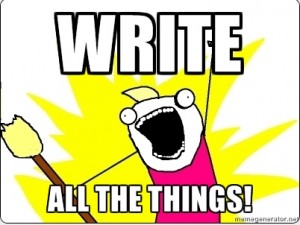 Quite a few new writers embark on their first novels using first person POV. Sometimes this POV, in past or present, is indeed le choix juste. Other times, it’s less considered and more of an accident.
Quite a few new writers embark on their first novels using first person POV. Sometimes this POV, in past or present, is indeed le choix juste. Other times, it’s less considered and more of an accident.
What causes us to bumble down this road? There are plenty of reasons, but the two I’ve seen most are these. First, if you haven’t been writing short stories or fanfic* before embarking on noveling, for example, it’s quite likely that the inside of your protagonist’s head is shockingly like the inside of yours. Their voice is a lot like your voice. So why not let them just, y’know, talk? It’s comfortable, like the things you wear on the weekend when nobody’s coming to visit.
(*Seriously, fanfic is a stupendous** way to get out of your own head and practice POV, dialog and voice if you’re just starting out. Pick a show where your knowledge is extensive and your love runs deep. Grab a favorite character, and drive around in their skin for a scene or two. Switch to the character you like least. Give them the wheel. Compare the results with whatever you’re writing now.)
(**Note to self: get the word stupendous into more heavy rotation.)
Another reason people get drawn into first person sometimes is that if you haven’t been writing for long and are going at it instinctively but without any kind of theoretical grounding (that sounds lofty, I know, but it’s less about academic snobbery and more about knowing that sticking two boards together is easier if you have a hammer and nail, or at the very least a glue gun) you may have a sense that some kind of narrative voice is… necessary. But at the same time, you may not be sure how to make it happen. Reaching for a main character named “I,” in that situation, is something of an automatic response.
So, good choice or bad, you’re in it now. First person narrator. Damn the torpedoes. How are you most likely to suck?
By making I a self-centered narcissist: The only character in the story with any degree of depth is that narrator, whom we’ll now name Vorpal. Everyone Vorpal meets in this book is onstage to be something of a flappy-armed excuse for either conversation or action. When they’re snarky, they’re clearly the one in the wrong. When they do things that intensify the conflict, they come off as a bit irrational. What drives these people? Why are they tormenting poor Vorpal? Do we even know? Can we, let’s face it, even tell them apart?
A thing about first person as a narrative choice is that you are always going to see Vorpal’s perspective most clearly… and so the characterization of everyone else has to be filtered through their perceptions. In exchange for an intense and intimate portrait of one person, you get an entire cast of other characters who can only be drawn from the outside. And that’s hard! So you can make your narrator cool and capable, a top neurosurgeon-type who designs Prada-quality bags in their spare time, and also has recorded a hit song for the new Buckaroo Banzai reboot… but if Vorpal is also an insensitive blockhead–someone who doesn’t notice things about the other characters or occasionally try to empathize with them–chances are great that your story will fall flat.
I verb, I verb, I verb. It is the truth universally acknowledged that new writers will often fall into a pattern of describing action with a long string of sentences that open with a character name and then an action.
I walked down the street and got the paper. I opened it up, and immediately saw the Wanted poster for Danny McGrew. Then I ran back home to tell Mom.
“Vorpal,” I heard her say, as she flapped her arms in surprise, “How do you find time to run down fugitives between your neurosurgery practice and Fashion Week?”
I replied, “I’ve just coded the most stupendous time management app ever!”
This is a habit to break no matter what POV you’re writing in. Obviously. Varied sentence structure = good, okay? But an additional effect of a passage like this when written in first person is that the reader’s ear picks up on the sound of someone endlessly yakking about themselves. Which is alienating – it can make us dislike even a pretty great character.
The surging oceans of inner turmoil are just gonna make us seasick. One of those two-dimensional crazy-ass supporting characters has just stormed off-stage, after giving Vorpal shit they probably did not deserve. And now, we get the unmitigated treat of three pages of: “How could they say that? Don’t they know my heart is forever theirs, and also I’m busy performing the Twelve Labors of Hercules here, on a budget I might add, and maybe this is a good time to mention again that I have post traumatic stress disorder and to launch a long flashback to the Maiming Fields of Kansasland. I felt so betrayed…”
Not only can this verge perilously close to whining–another thing that can drain a reader’s sympathy well–but it is the sort of thing that can happen without giving us a single sensory image. We might as will be in a dark room listening to a monologue. Action stops. The gnash of a broken heart is everything.
Contortionist fail. Meanwhile, halfway through the book, it suddenly occurs to you that Vorpal really cannot be present to witness the pivotal sex scene between their cheating life partner and their fellow stage magician, Burn the Magnificent. Can you fudge it with “Vorpal knew…?” No, we see what you did there. How many times can you get away with them eavesdropping on the other characters? Get off that windowledge, Vorpal, they deserve their privacy and you don’t want them calling the cops or, Chaos forbid, shooting at you. After Kansasland, you can’t really blame Burn for carrying that rifle around.
Can Vorpal pose as the hotel videographer? No.
Maybe no one will notice if you just dash behind the curtain, switch into third person for a minute, and let Burn take the mic. But are they a fully-realized and intriguingly voiced Burn, or just a 3rd person Burn who sounds a lot like Vorpal, right down to the accent, class, and education? It doesn’t matter, does it? Burn never takes center stage again. Hey, at least they got laid.
And indeed, maybe no one will notice.***
I’m just saying: sometimes these things are less glaring if you’ve thought them through earlier in the novel.
(***Actually, I’m just being polite. We’ll notice.)
The stuff Vorpal doesn’t know is way too important to share. Here your plot is headed in a super-mysterious direction, but nobody will tell poor Vorpal what’s going on. Because Vorpal’s probably pretty smart, right? If the other characters just ante up the info, obviously we’re all going to beeline to the end of the book. So instead you have the other characters swan onstage, make a few murky pronouncements, and then hightail it. Your narrator is confused and so are we. That’ll keep us hanging in for the middle ten chapters, right?
Or maybe not. Maybe you’re just being obscure, denying Vorpal their agency, and generally failing, as Kelly puts it, to get in there with the monkeys.
Now it is true that a lot of these pitfalls can arise with any POV. But first person is especially pitiless. It’s not a large cast opera, where the soprano spells off the tenor, and then they fall in love and the servants have to gossip pianissimo for it for awhile, and then a long bass versus bass smackdown breaks out, and anyway it’s opera so nobody expects the plot to make sense. First person POV is a solo concert: one point of view and the spotlight glaring down, hot enough to fry an egg. If we aren’t fascinated by Vorpal or at the very least inclined to like them as a person, we have nothing else–no other voice, no other perspectives, nothing but that hot Burn sex scene–to look forward to as the story unfolds.
If there’s one behind-the-scenes element of writing that you should know–one technical issue you ought to understand going in–my belief if that it’s this: point of view. Go with first person, but don’t fall into it by mistake. Choose wisely, and story well. Vorpal will thank you for it.





